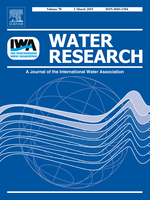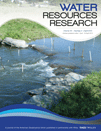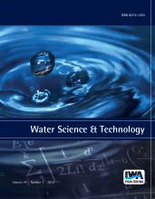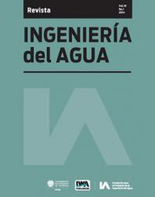
WATER RESEARCH
Scope & Guideline
Advancing water science for a sustainable future.
Introduction
Aims and Scopes
- Water Quality Assessment and Management:
Research related to evaluating the quality of various water sources, including groundwater, surface water, and treated wastewater. This includes studies on pollutants, contaminants, and innovative treatment technologies. - Hydrological Processes and Modeling:
Investigations into the hydrological cycle, including rainfall, runoff, and groundwater recharge. This encompasses the use of models to predict water behavior under different environmental conditions and management practices. - Water and Soil Interactions:
Exploration of the relationship between water management and soil health, including studies on soil erosion, nutrient dynamics, and the impact of water management practices on agricultural productivity. - Climate Change and Water Resources:
Research focusing on the effects of climate change on water availability, quality, and ecosystem health. This includes assessments of how changing climate patterns influence hydrological processes and water resource planning. - Integrated Water Resource Management (IWRM):
Studies promoting the integrated approach to managing water resources, which considers the interconnectedness of water, land, and environmental sustainability. This includes case studies and frameworks for effective policy implementation. - Technological Innovations in Water Treatment:
Research on new technologies and methodologies for treating water, including advanced filtration, bioremediation, and nanotechnology applications for pollutant removal.
Trending and Emerging
- Microplastic Pollution and Remediation:
An increasing number of studies focus on the sources, impacts, and remediation strategies for microplastics in freshwater systems, reflecting growing global awareness of plastic pollution's environmental implications. - Climate Resilience in Water Management:
Research is increasingly emphasizing how to enhance the resilience of water systems to climate change impacts, including droughts and floods, which is critical for sustainable water resource management. - Advanced Water Treatment Technologies:
There is a notable rise in studies exploring innovative water treatment technologies, including nanotechnology and bioremediation, to address emerging contaminants and improve water quality. - Geospatial Analysis and Water Resource Management:
The use of geospatial technologies and modeling to assess and manage water resources is gaining momentum, facilitating more informed decision-making in water management practices. - Water-Energy-Food Nexus:
Research exploring the interconnections between water, energy, and food systems is emerging as a critical area, particularly in the context of sustainable resource management and climate change adaptation.
Declining or Waning
- Conventional Agricultural Practices:
There has been a notable decrease in research focused on traditional agricultural practices without innovative adaptations. This may be due to a growing emphasis on sustainable and precision farming techniques that prioritize water efficiency. - Urban Water Management Challenges:
While urban water management remains a critical area, the specific challenges previously highlighted, such as infrastructure decay and traditional supply systems, are less frequently addressed in favor of broader discussions on integrated and sustainable approaches. - Basic Soil Chemistry Studies:
Papers focusing solely on fundamental soil chemistry without context to water interactions or environmental implications are becoming less prominent, as the field shifts towards integrated studies that link soil health with water quality. - Traditional Water Quality Monitoring:
Research centered on basic monitoring techniques without the integration of advanced technologies or innovative approaches is declining, reflecting a shift towards more comprehensive and technology-driven assessments.
Similar Journals

WATER RESOURCES RESEARCH
Empowering Knowledge in Water Resource ScienceWATER RESOURCES RESEARCH, published by the American Geophysical Union, stands as a premier journal in the field of environmental science, specifically within the domain of water science and technology. With an impressive impact factor and a categorical ranking of Q1 for 2023, it ranks within the top 10% of relevant journals, evidencing its critical role in advancing the knowledge and application of water resources research. Since its inception in 1965, the journal has been dedicated to rigorous research that addresses pressing global challenges related to water resource management, hydrology, and environmental sustainability. The journal's comprehensive publication scope aims to present innovative findings and methodologies that can shape effective policies and practices. Although it does not offer open access, the robust research it publishes continues to influence academics and practitioners alike, ensuring its position as an essential resource for anyone engaged in the pursuit of water-related knowledge and solutions.

Hydrology
Fostering dialogue on water resource management.Hydrology, published by MDPI, is a prominent open-access journal dedicated to advancing the field of hydrological science. Since its establishment in 2014, the journal has garnered a reputation for excellence, reflected in its classification within the Q2 quartile for 2023 across multiple categories including Earth-Surface Processes, Oceanography, Water Science and Technology, and Waste Management and Disposal. Based in Switzerland, Hydrology provides a vital platform for scholars and practitioners to disseminate research findings, promote innovative methodologies, and foster discussions on current trends affecting water resources and management globally. The journal is easily accessible online and aims to significantly contribute to the understanding of hydrological processes, offering insights that are pivotal for addressing contemporary environmental challenges. With Scopus rankings showcasing its growing influence, Hydrology is a crucial resource for researchers, students, and professionals committed to water science and sustainable practices.

Soil and Water Research
Empowering Research for a Sustainable FutureSoil and Water Research, an esteemed journal published by the Czech Academy Agricultural Sciences, is dedicated to advancing the fields of Aquatic Science and Soil Science. With a strong commitment to open access since 2006, this journal facilitates the dissemination of high-quality research and fosters global collaboration among researchers, professionals, and students. Operating from the vibrant academic hub of Prague, Czech Republic, it serves as a key resource for those interested in pressing environmental and agricultural challenges. Featuring a robust H-index and ranking in the Q2 category for both Aquatic Science and Soil Science as of 2023, Soil and Water Research occupies a prominent position in Scopus, ensuring that published works reach a wide audience. The journal invites contributions that explore innovative methodologies and provide insights into soil and water management practices, thus playing a critical role in addressing sustainability issues within these interconnected domains. As researchers navigate the complexities of climate change and resource management, Soil and Water Research stands out as a vital tool for informed decision-making and impactful research.

Water Conservation Science and Engineering
Transforming Water Challenges into Engineering SolutionsWater Conservation Science and Engineering, published by SPRINGERNATURE, is a vital academic journal dedicated to advancing the fields of environmental engineering, ocean engineering, waste management, and water science and technology. Since its inception in 2016, the journal has quickly established itself within the academic community, achieving a commendable Q3 ranking across multiple categories in 2023. With an ISSN of 2366-3340 and an E-ISSN of 2364-5687, it is accessible to a global readership eager to explore the latest research and innovations in water conservation and sustainable practices. Although currently not open access, the journal is committed to publishing high-quality scholarly articles that provide insights into effective water management strategies, innovative engineering solutions, and the critical importance of preserving our water resources. Based in Singapore, Water Conservation Science and Engineering aims to foster interdisciplinary collaboration among researchers, professionals, and students, making it an essential resource for anyone passionate about environmental sustainability and preservation.

WATER RESOURCES MANAGEMENT
Bridging Theory and Practice in Water Resource EngineeringWATER RESOURCES MANAGEMENT is a prestigious journal published by SPRINGER, renowned for its contribution to the fields of Civil and Structural Engineering as well as Water Science and Technology. Operating since 1987, this journal has established itself as a vital resource for researchers, professionals, and students alike, boasting a remarkable impact factor and a Q1 designation in both relevant categories as of 2023. The journal is indexed in Scopus, achieving commendable ranks—34th in Environmental Science and 62nd in Civil and Structural Engineering, placing it in the top percentiles of its fields. Although it does not offer open access, WATER RESOURCES MANAGEMENT serves as a comprehensive platform for disseminating innovative research, discussions, and case studies that address the global challenges of water resource management. With a commitment to fostering knowledge and advancing the understanding of integrated water management solutions, this journal is indispensable for anyone engaged in these critical scientific domains.

Journal of Applied Water Engineering and Research
Exploring the Future of Water Resource ManagementJournal of Applied Water Engineering and Research is a dynamic platform dedicated to the advancement of knowledge in the field of water science and technology. Published by Taylor & Francis Ltd, this journal aims to bridge the gap between theoretical research and practical applications in water engineering, providing a crucial resource for researchers, practitioners, and policymakers. With an ISSN of 2324-9676 and an impressive ranking in the Q3 category for Water Science and Technology, it occupies a distinctive position within the scholarly community. The journal covers a wide spectrum of topics, including innovative water management strategies, sustainable practices, and the integration of technology in water resource management, thus contributing significantly to the discourse surrounding environmental sustainability. With publication years converging from 2013 to 2024, the Journal of Applied Water Engineering and Research continues to foster impactful research, enhancing our understanding and management of vital water resources.

WATER SCIENCE AND TECHNOLOGY
Connecting knowledge and technology for sustainable water practices.WATER SCIENCE AND TECHNOLOGY, published by IWA PUBLISHING, is a leading academic journal dedicated to advancing the field of water science and technology. With a rich history dating back to 1970, the journal provides a platform for innovative research and technological advancements, catering to the vital challenges faced within the realms of environmental engineering and water resource management. As evidenced by its strong ranking in Scopus, where it holds a position of #86 in Water Science and Technology and #77 in Environmental Engineering, the journal exemplifies significant scholarly contributions, reflected in its Q2 quartile status in both categories as of 2023. Although not an open access journal, WATER SCIENCE AND TECHNOLOGY ensures that its articles are widely available to researchers, professionals, and students passionate about sustainable water solutions. With a continued commitment to excellence, this journal plays a crucial role in shaping the discourse surrounding water quality, conservation, and technology innovation, making it an essential resource for all stakeholders in this critical field.

Water
Innovative insights into the world of water and its sciences.Water, an esteemed journal published by MDPI, serves as a pivotal resource for global research in the fields of aquatic science, biochemistry, geography, and water science and technology. Since its inception in 2009, this open-access journal has committed itself to advancing knowledge regarding water-related topics by fostering a platform that encourages the dissemination of high-quality research. With its impressive impact factor reflecting its relevance and influence, Water ranks in the top quartiles in various categories, including Q1 in Aquatic Science and Water Science and Technology, showcasing its commitment to publishing cutting-edge findings that resonate deeply with the environmental and biological sciences community. Located in Basel, Switzerland, the journal prioritizes accessibility for researchers, professionals, and students alike, aligning with the broader scientific goal of addressing urgent water challenges through collaborative and interdisciplinary research.

Ingenieria del Agua
Advancing Sustainable Solutions in Water EngineeringIngenieria del Agua, published by Universitat Politècnica de València, Editorial UPV, is a prominent open-access journal dedicated to the field of water engineering and management. With its ISSN 1134-2196 and E-ISSN 1886-4996, this journal has been facilitating the dissemination of critical research and innovative practices in water resources since 1994. With a commitment to providing unrestricted access to high-quality research, Ingenieria del Agua aims to serve as a pivotal platform for researchers, professionals, and students alike. Focused on the intersection of hydrology, environmental engineering, and sustainability, the journal encourages submissions that address contemporary challenges in water resource management, promoting advancements that are vital for both ecological conservation and societal needs. By fostering a collaborative academic environment, it plays an essential role in shaping the future of water engineering.

Water Resources and Industry
Connecting Academia and Industry for Water InnovationWater Resources and Industry, published by Elsevier, stands at the forefront of research in the critical fields of water science and technology, as well as geography, planning, and development. With an impressive 2023 impact factor that places it in the Q1 category for both Geography and Water Science on a global scale, this journal is a vital resource for academics, professionals, and students seeking to advance their understanding of water-related issues impacting industries worldwide. Since its inception in 2013 as an Open Access journal, it has fostered innovative research and practical solutions to challenges in water resource management. Located in the vibrant academic hub of Amsterdam, the journal encourages submissions that cover a broad spectrum of topics, from sustainable practices and policy development to technological advancements in water treatment and distribution. By making its research publicly accessible, Water Resources and Industry not only contributes to scholarly discourse but also empowers stakeholders to implement evidence-based strategies for water sustainability, thereby enhancing its relevance and impact in today's world.